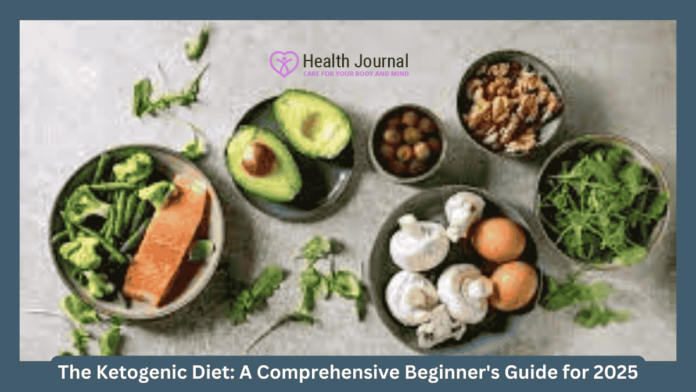What is the Ketogenic Diet?
The ketogenic diet, often referred to simply as the “keto diet,” is a high-fat, moderate-protein, and very low-carbohydrate eating plan. The goal of the keto diet is to shift your body’s metabolism from burning carbohydrates for energy to burning fat instead. This is achieved by drastically reducing the intake of carbs and increasing the consumption of healthy fats. As a result, your body enters a state called ketosis, where it starts to burn fat for fuel instead of sugar.
For beginners, the idea of drastically cutting carbs can be a bit overwhelming, but the keto diet has gained popularity due to its potential benefits, including weight loss, improved energy levels, and better mental clarity.
In this guide, we will break down the essential components of the ketogenic diet, tips for beginners, and everything you need to know to get started.
How Does the Ketogenic Diet Work?
To understand how the ketogenic diet works, it’s important to look at the concept of ketosis. Typically, your body uses glucose (from carbohydrates) as its primary source of energy. However, when you consume fewer carbs, your body runs out of glucose and begins breaking down fat into molecules called ketones. These ketones become the new fuel source for your body.
This process, known as ketosis, is what makes the ketogenic diet effective for weight loss. With fewer carbs, your body starts burning stored fat for energy, which can result in significant fat loss over time.
Key Components of the Ketogenic Diet
1. High Fat Intake
A typical ketogenic diet is made up of about 70-75% fats, with a focus on healthy fats. This includes fats from sources such as:
- Avocados
- Olive oil
- Coconut oil
- Nuts and seeds
- Fatty cuts of meat (like salmon, beef, and lamb)
These fats provide the body with the energy it needs during ketosis while also promoting feelings of fullness.
2. Moderate Protein Intake
Protein intake on the keto diet is moderate—typically around 20-25% of your daily calories. It’s important to eat enough protein to maintain muscle mass but not so much that it kicks you out of ketosis. Protein-rich foods include:
- Meat (beef, pork, chicken)
- Eggs
- Fish and shellfish
- Tofu and tempeh
3. Low Carbohydrate Intake
Carbohydrates make up only about 5-10% of your daily intake on a ketogenic diet. This means avoiding foods like:
- Bread and pasta
- Rice, potatoes, and other starchy vegetables
- Sugary foods and drinks (like soda, sweets, and juices)
Instead, you’ll focus on eating low-carb vegetables, such as leafy greens, broccoli, and cauliflower.
Foods to Eat on the Ketogenic Diet
Here are some examples of foods that are encouraged on the ketogenic diet:
- Meats: Beef, pork, chicken, turkey, and lamb
- Fish & Seafood: Salmon, tuna, shrimp, and sardines
- Low-carb Vegetables: Spinach, kale, lettuce, cucumbers, and zucchini
- Healthy Fats: Avocados, olive oil, butter, coconut oil, and ghee
- Dairy Products: Cheese, heavy cream, and Greek yogurt (unsweetened)
- Nuts & Seeds: Almonds, walnuts, chia seeds, and flaxseeds
Additionally, you can drink drinks like coffee, tea, and water. Be sure to avoid drinks with sugar, such as soda and fruit juice.
Foods to Avoid on the Ketogenic Diet
To maintain ketosis, you’ll need to eliminate or drastically reduce your intake of high-carb foods. Some foods to avoid include:
- Grains: Rice, bread, pasta, and cereal
- Starches: Potatoes, sweet potatoes, corn, and peas
- Sugary Foods: Candy, cakes, cookies, ice cream, and soda
- High-carb Fruits: Bananas, grapes, apples, and oranges
It’s important to read food labels carefully to avoid hidden sugars and carbs, especially in packaged foods.
Benefits of the Ketogenic Diet
The ketogenic diet has been linked to several potential health benefits. Here are some of the most commonly reported advantages:
1. Weight Loss
The keto diet is well-known for helping people lose weight quickly, as it forces the body to burn fat for fuel. In addition, the high fat and moderate protein intake promote satiety, which may help you eat fewer calories overall.
2. Improved Blood Sugar Control
For those with Type 2 diabetes or prediabetes, the ketogenic diet may help stabilize blood sugar levels and improve insulin sensitivity. By reducing carb intake, blood sugar spikes are minimized, which can have a positive impact on overall health.
3. Enhanced Mental Clarity
Many people report increased focus and mental clarity on the ketogenic diet. Ketones are a highly efficient fuel source for the brain, which may help improve cognitive function.
4. Increased Energy Levels
By relying on fat for energy instead of carbohydrates, the keto diet may help maintain steady energy levels throughout the day, avoiding the crashes that often follow high-carb meals.
5. Potential Therapeutic Benefits
Emerging research suggests that the ketogenic diet may have therapeutic effects for conditions such as epilepsy, Alzheimer’s disease, and even cancer. However, more research is needed in these areas.
Tips for Beginners on the Ketogenic Diet
If you’re just starting with the keto diet, here are some tips to help make the transition smoother:
- Start Slow: Gradually reduce your carb intake over a week or two instead of making an abrupt change. This can help prevent “keto flu,” a set of flu-like symptoms some people experience when starting the diet.
- Stay Hydrated: The ketogenic diet can lead to increased water loss, so be sure to drink plenty of water and consider replenishing electrolytes with sodium, potassium, and magnesium.
- Plan Your Meals: Meal planning can help ensure that you stay on track with your diet and avoid tempting high-carb foods.
- Track Your Macros: Using a tracking app can help you ensure that you’re eating the right ratio of fats, proteins, and carbohydrates to stay in ketosis.
Possible Side Effects and Considerations
While the ketogenic diet has many benefits, it may not be suitable for everyone. Some people may experience side effects, such as:
- Keto Flu: Symptoms like headache, fatigue, and nausea when transitioning to a low-carb diet.
- Digestive Issues: Constipation or digestive discomfort due to the lack of fiber from high-carb foods.
- Nutrient Deficiencies: It’s important to ensure you’re getting enough vitamins and minerals, especially if your diet is very restrictive.
If you have any pre-existing medical conditions, such as kidney disease, it’s essential to consult a healthcare provider before starting the ketogenic diet.
Conclusion: Is the Ketogenic Diet Right for You?
The ketogenic diet offers a unique approach to weight loss and health improvement by drastically reducing carbs and increasing fat intake. If you’re considering trying the keto diet, it’s essential to educate yourself on how it works and to monitor your progress. By focusing on healthy fats, moderate protein, and very few carbs, many people experience significant benefits, from weight loss to improved mental clarity.
Before starting any new diet, especially one as restrictive as the keto diet, it’s a good idea to consult with a healthcare provider or a nutritionist to ensure it’s the right choice for your lifestyle and health goals.









